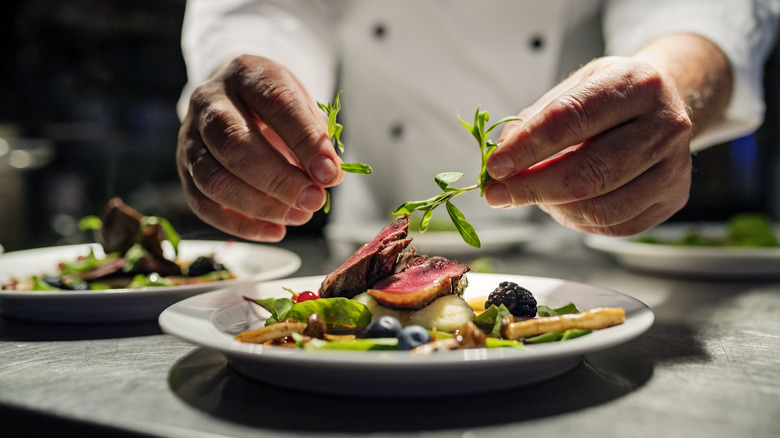What Chefs Mean When They Say A Restaurant Order Is 'All Day'
If you watched "The Bear" and immediately started saying things like "behind" and "heard" (and, but of course, "yes, chef") in your everyday life, you've probably started to wonder about some of the less self-evident food words and phrases frequently used in the show. Restaurant workers have their own way of speaking to one another — one formed out of the necessity of a work environment that is, by definition, loud, fast-paced, and unforgiving to mistakes.
Luckily, you don't have to be a culinary expert to understand the terms used in most restaurant kitchens. One of the common ones you may have heard is the phrase "all day." This one is definitely not obvious, as its actual meaning is somewhat counterintuitive to how it sounds. When someone says they need a certain number of dishes "all day," they are referring to how many dishes they need at that exact moment.
How to use 'all day' like a chef
When servers deposit order tickets at the rail in the kitchen, it's the responsibility of the chef, sous chef, or other staff member stationed there to call out those orders in the most efficient way. (This person is known as the expo, or expeditor.)
If seven different people at different tables (and thus, on different tickets) have ordered the salmon, it makes more sense to call out the grand total of "seven salmon, all day," than it does to call out how many are needed for each individual ticket. This also allows the kitchen team to assess in the moment if they have the ingredients to fulfill all of these orders, and if they anticipate running short on anything.
It's uncertain why the phrase "all day" came to be used in this way. It could have evolved from one chef admonishing his staff "not to take all day," but no one really knows.
How to respond to an 'all day'
If you hear "all day" in a kitchen, it will likely trigger a call and response. Either the chef responsible for executing the order will repeat the items back to the expo, or they will call out "heard" to indicate that the order has been received. A chef can also call for an "all day" at any point in the shift, to request an order count for a specific item, or for all the dishes going through their station.
You might also hear "all day" alongside the term "fire." When a dish is fired, that means the server has input it into the system to generate a ticket or chit. The chit gets read by the expo, who is also responsible for checking dishes before they go onto the floor, adding any last-minute garnishes, and grouping dishes going to the same table. The expo window where finished dishes go is also where the ticket rail lives, so every order passes in and out of the same space, making your all-day tally an important method for organizing the expo station and making sure that dishes go out on time.



